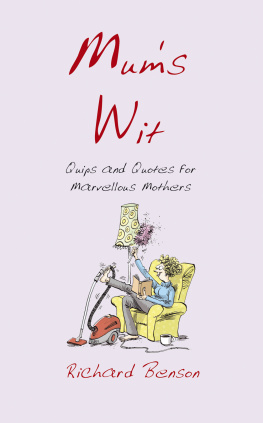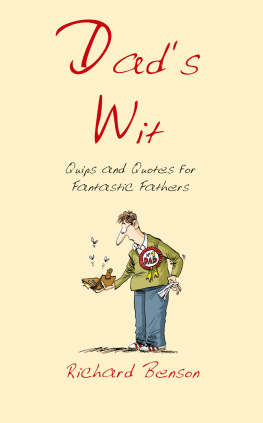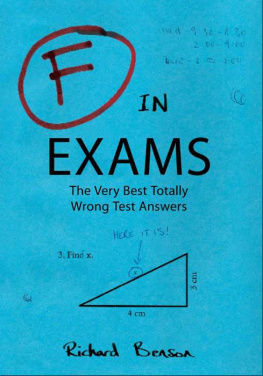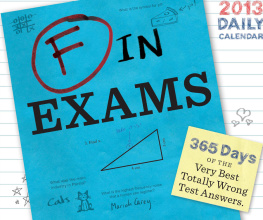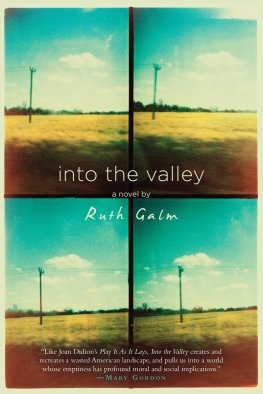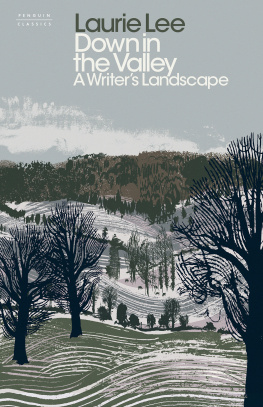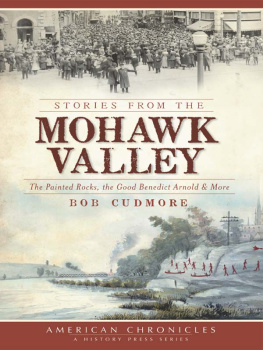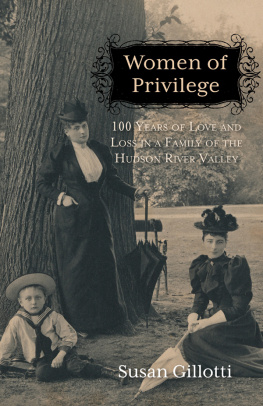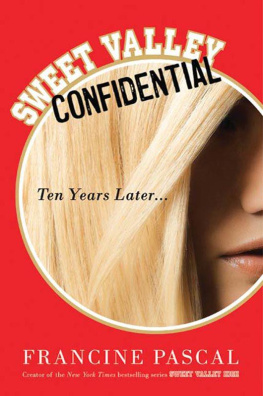I was able to write this book only because of my extended familys generosity and willingness to share and record details of their lives, and I am deeply grateful to them for the time they afforded me, and for their patience in helping with my questions, revisions and fact checks. In particular Lynda and John Burton, Gary and Heather Hollingworth, David and Marie Hollingworth, Karl Grainger and Pauline Benson spent what must have seemed to them many long hours remembering and explaining and re-explaining to me. Other family members who helped me with interviews and answers to questions were Anne and Malcolm Askew, my father the late Gordon Benson, Guy Benson, Helen Benson, Claire and Bob Blake, Alan Blow, Amanda Bouskill, Eileen Bullock, Joan Chambers, Kevin Dunkley, Carol Goulding, Tommy Goulding, Jack Graham, Joyce Graham and Janet Graham, the late Margaret Greengrass, the late Pam Gundry and Jack Gundry, Lisa Hollingworth, the late Millie Hollingworth, Scott Hollingworth, Tommy Hollingworth, Wendy Hollingworth, Brian Lunness, the late May Parkin and Heather Wargen. The steward and members of Highgate Working Mens Club, the Unity Club and the Coronation Club, Thurnscoe were helpful, good storytellers, and very good company.
Equally patient and understanding have been the staff at Bloomsbury Publishing. Michael Fishwick and Anna Simpson were incredibly kind, supportive and helpful, and my copyeditor Kate Johnson helped me indescribably, and taught me a great deal about books and writing in the process. Thank you too to Laura Brooke, Katie Bond, Alexa von Hirschberg, Oliver Holden-Rea, Alexandra Pringle and David Ward.
My agent David Godwin and the staff at David Godwin Associates have been sturdy props and good friends.
Dan Johnson helped me with research, and was a great companion and source of insights. Laura Smith also helped to research certain areas. John Threlkeld at the Barnsley Chronicle and author of Pits: A Pictoral History of Mining was very generous in helping me with fact-checking. Other people advised me on specific subjects. Jolyon Lawson, proprietor of the coal merchant F. W. Lawson Ltd in Driffield, East Yorkshire, explained the differences between the different forms of coal. Miles Templeton of pre-warboxing.co.uk sourced the historical records of Danny Lunnesss boxing bouts. Chris Baker of fourteeneighteen research helped me with Walter Parkins experience in the First World War, and Jane Hewitt helped with general family history research. Dr Sarah Thornton diagnosed and described medical conditions. Alan Petford, Edward Royle and Sara Crofts of the Chapel Society helped me to visualise the interior of a turn-of-the-century spiritualist church. John Jock Marrs, a veteran of the Korean War and editor of britains-smallwars.com, told me about life as a soldier in the Suez Canal Zone, and this information and the stories on the site were important sources for me when writing about Roys military experience.
The Shirebrook Local History Group, headed by Ian P. Hill, was welcoming, enthusiastic and learned. I was very lucky to meet the late Mr Harold Daniels, then its oldest member, who recalled attending the spiritualist church with one of Annie Weavers younger sisters, whom he was courting at the time. He told me that the girls used to trick their boyfriends into going by agreeing to accompany them to the pub on the condition that the young man would later accompany them on an as-yet unspecified date. The boys would always protest, but the girls would reply, Ive been to your church, now you come to mine. The story confirmed that Walters interest would have marked him out as unusual among the men of his age.
Many people helped me to improve my understanding of spiritualism, and to find the building that housed the church in Shirebrook where Walter and Annies relationship began. Annie Blair of the Spiritualist Association of Great Britain, and the mediums Alan Acton and Richard Neville, described the processes and nature of Spirit when I needed clarification, and Leslie Price and Paul J. Gaunt of the PsyPioneer Journal filled in historical sense and detail. The congregation of Mansfield Spiritualist Church, particularly Jean Stevens, welcomed me at their healing services, and John Stanfords memories of spiritualism in Shirebrook were invaluable. Sharon Brailsford of the Shirebrook Local History Group helped to extricate me from an awkward situation when I unintentionally trespassed on a farmyard in my excitement at having discovered the former spiritualist church.
I am especially grateful to Hazel Batley of Barnsley for explaining how nineteenth- and early-twentieth-century spiritualists sought to democratise not only religious faith and epistemology, but also medicine and healing. The more I learned about this as I worked on the book, the more I saw similarities between Lyndas independent thinking about her condition and the spiritualist healers of Walter and Annies generation, although I fear I have yet to convince Lynda herself of this.
Ex-miner and author David John Douglass was helpful and inspiring, and taught me how to see my grandmothers stories in the context of the miners sense of history. Coal mining was hard and dangerous work, and pit villages could be harsh places in which to live, but it seems to me that the decent people of Harry and Winnies generation, and several generations preceding it, had a quiet belief that they were working together to improve themselves, their working conditions and their environments. This lent a sense of purpose, or at least of being headed somewhere; you had made the present more comfortable than the past, and the future would be more comfortable again. From the late twentieth century onwards that sense has ebbed away somewhat, and with it a component of an old sense of identity. One of several ideas that have moved into its old space is nostalgia; a question asked by people trying to revive ex-mining communities is: is it possible to draw lessons and values from the past that can be adapted to the future, and thus used to restore some of that lost identity? David John Douglass considers these questions in his autobiographical trilogy Coaldust and Stardust , which is the best account of a modern coal miners life that I know, and was a source for some of the history in this book. I would also like to thank the writers Barry Hines and Paul Routledge for helping and encouraging me when I talked to them about my family and the Dearne Valley.
Dozens of other people talked to me about family stories or the Dearne Valley in general, including: Albert Blessed; the members of the Bolton-upon-Dearne local history group; Don Booker, former editor of the Barnsley Chronicl e ; Tim Brant of the Merchant Navy Association; Richard Breese, Strategic Director of the South Yorkshire Coalfield Partnership; Marylise Campbell of the Sprotborough Library book group; Ann Carr, church warden at Goldthorpe Parish Church; Betty Cook; Donald Edes; Brian Elliott, historian; Tony Farsides; Dave Feickert, historian; Anne Gray; Richard Gray; Dieter Hopkin, then at the National Mining Museum; Peter Hyman; Margaret Lister, 1972 Yorkshire Coal Queen; Jennifer Kabat; Janet King; Susan Linstead at the Dearne Advanced Learning Centre; Ann Littlewood, author of Storthes Hall Remembered ; David Lunn, former Bishop of Sheffield; Father Rodney Marshall, former vicar of Goldthorpe; Julie Medlam, Theatre Manager at the Dearne Playhouse; Rick Naylor of the Police Superintendents Association; Father Peter Needham, the vicar of Grimethorpe; Paul Cornerford and Peter Farnham of WSP Development & Transportation; Anne Scargill; Dirk Sheldon; Inky Thompson, former NUM official and Barnsley councillor; Fred Walker; Barry Westerman, former steward of Highgate Working Mens Club; Geoff Widdop; and Bruce Wilson.
People who helped in other ways include Stephen Armstrong, Kevin and Alan Braddock, the Rev. Marjorie Brown, Richard Budge, the Churchill Centre, Gareth Coombs, Robin Denselow, Allie Dickinson, Andrew Duerden, John Edmondson, Ekow Eshun, Charles Gant, Andrew Harrison, Mark Hodkinson, Anwen Hooson, Graeme Johnson, Ted Kelly, Cllr Graham Kyte, Peter Lyle, Sean Moore, the National Union of Mineworkers, Stuart Oliver of UK Coal, Julian Rudd, Laura St Quinton, Cllr Ken Sanderson, Rob Sellars, Laura Smith, the Sprotbrough Library book group, Tony Swaby and Kevin and Nicola Welsh. Staff at the following library departments also helped with research: Doncaster Central Library Archives and Local Studies Department, Barnsley Central Library Archives and Local Studies Department, Chesterfield Local Studies Library, Sheffield Archives and Local Studies Library, Shirebrook Library, and the Working Class Movement Library, Salford.
Next page

